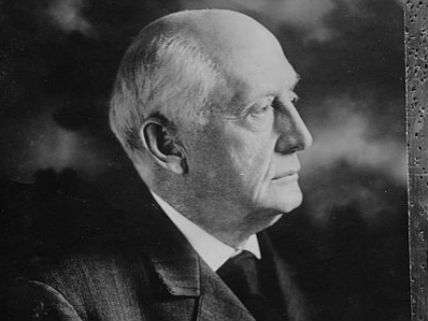The Libertarian Lawyer Who Battled Jim Crow
The relationship between Lochner v. New York and Buchanan v. Warley
At Marginal Revolution, George Mason University economist Alex Tabarrok offers some interesting thoughts on Richard Rothstein's new book The Color of Law: A Forgotten History of How Our Government Segregated America. "Rothstein is no libertarian," Tabarrok writes, "but to his credit he does acknowledge that one of the few anti-segregation forces in the early twentieth century was the Lochner influenced reasoning of the Supreme Court."
Tabarrok refers to the 1917 case of Buchanan v. Warley, in which the Court struck down a Louisville, Kentucky, ordinance that segregated residential housing blocks by race. The Court invalidated that Jim Crow regulation as an unconstitutional violation of property rights and economic liberty under the 14th Amendment.
Here is how Rothstein summarizes Buchanan v. Warley in The Color of Law:
The Court majority was enamored of the idea that the central purpose of the Fourteenth Amendment was not to protect the rights of freed slaves but a business rule: "freedom of contract." Relying on this interpretation, the Court had struck down minimum wage and workplace safety laws on the grounds that they interfered with the right of workers and business owners to negotiate individual employment conditions without government interference. Similarly, the Court ruled that racial zoning ordinances interfered with the right of a property owner to sell to whomever he pleased.
The central holding of Lochner v. New York (1905) was that the 14th Amendment protects a fundamental right to economic liberty, including the right to liberty of contract. It is not an unlimited right; it is subject to reasonable government regulation. But in order for such regulation to pass muster in court, it must serve a legitimate and demonstrable public health or safety purpose. That same reasoning underlines the Court's opinion in Buchanan v. Warley.

The libertarian lawyer Moorfield Storey argued and won Buchanan before the Supreme Court. A thoroughgoing individualist, Storey championed laissez-faire economics, denounced militarism, and opposed the rise of the populist Democrat William Jennings Bryan. In addition to serving as the president of the American Bar Association, Storey was a founder and president of the Anti-Imperialist League and was the first president of the NAACP.
Storey led the NAACP's fight against the Louisville segregation law. In his brief to the Supreme Court, Storey (with co-lawyer Clayton B. Blakely) argued that the law "destroys, without due process of law, fundamental rights attached by law to ownership of property." The law's purpose was not "to prevent conflict and ill-feeling" between the races, as it claimed, but rather "to place the negro, however industrious, thrifty and well-educated, in as inferior a position as possible with respect to his right of residence, and to violate the spirit of the Fourteenth Amendment without transgressing the letter."
Lochner v. New York was one of the legal authorities cited in support of those arguments.
In its brief, the state of Kentucky argued that the federal courts had no business interfering with the power of local majorities to enforce their social and economic preferences via regulation. "Whether the legislation is wise, expedient, or necessary, or the best calculated to promote its object," the state maintained, "is a legislative and not a judicial question."
The Supreme Court disagreed and nullified the Jim Crow law. It was a far-reaching decision. At that time, other municipalities around the country were considering or even implementing their own residential segregation schemes. Buchanan stopped those schemes once and for all. According to Storey's colleague at the NAACP, W.E.B. DuBois, Buchanan should be credited with "the breaking of the backbone of segregation."
That is the landmark case whose reasoning Rothstein slights as a "business rule."
It is also worth noting that the same "business rule" that helped protect black Americans from Jim Crow in Kentucky also helped to protect Chinese-Americans from racist government abuse in California.
In 1882 the city of San Francisco passed an ordinance that required anyone seeking to operate a laundry business within city limits to first obtain "the consent of the board of supervisors, which shall only be granted upon the recommendation of not less than 12 citizens and taxpayers in the block in which the laundry is proposed to be established, maintained, or carried on."
That law's real objective was to prevent Chinese immigrants from further establishing themselves in the laundry business. One of those would-be laundry operators, Quong Woo, filed suit in federal court, arguing that the ordinance served no lawful government purpose.
The court agreed. Writing for the Circuit Court for the District of California, Justice Stephen Field, one of the intellectual architects of the Supreme Court's later Lochner-ian jurisprudence, held that government regulations may not be used "as a means of prohibiting any of the avocations of life which are not injurious to public morals, nor offensive to the senses, nor dangerous to the public health or safety." Justice Field struck down the law for violating the 14th Amendment.
The city's requirement that prospective business owners first receive permission from their neighbors, Field observed, cannot possibly be justified on health or safety grounds. All the requirement did was subject the exercise of a basic economic freedom to "the favor or caprice of others." Quong Woo, Field pointed out, was more than happy to abide by local regulations and to pay whatever fees the city required; yet on account of the "great antipathy and hatred towards the people of his race," he simply could not locate twelve neighbors willing to green light his enterprise.
Once again, the "business rule"—otherwise known as the fundamental right to economic liberty under the 14th Amendment—put a stop to an act of racist government abuse.
Related: How the Government Created Housing Segregation [Reason Podcast]


Show Comments (22)